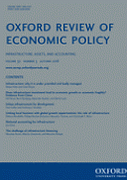The New Battle of Ideas: how an intellectual revolution will reshape society
30 septembre 2021

Collier P., Tuckett D. (2021) Narratives as a Coordinating Device for Reversing Regional Disequilibrium, Oxford Review of Economic Policy, vol. 37(1), Spring 2021, pp. 97–112.